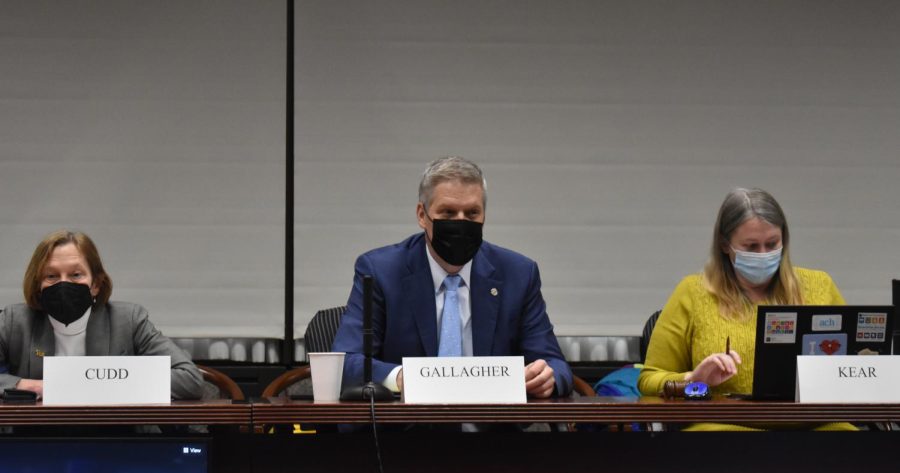Senate council discusses COVID-19 regulations for spring break, passes two policies
Alyssa Carnevali | Staff Photographer
Provost Ann Cudd, left, Chancellor Patrick Gallagher and Senate Council President Robin Kear at Wednesday’s Senate Council meeting.
February 25, 2022
With spring break quickly approaching and COVID-19 cases on campus dropping, Chancellor Patrick Gallagher said Pitt will follow the same guidelines as it did over Thanksgiving break.
Pitt will require that unvaccinated students provide a negative COVID-19 test over break. Vaccinated students are encouraged, but not required, to test upon their break.
“I do want to remind everyone to continue to be vigilant,” Gallagher said. “We are monitoring and working closely with what that means for our campus, but we want to make changes from a position of strength.”
Gallagher spoke about spring break at Wednesday’s Senate Council meeting held virtually and in person at Posvar Hall. Gallagher said he urges students to schedule booster shots with the Pitt CoVax Vaccination center and reminds students to upload their updated vaccination cards to the Student Health Portal.
“We are strongly, [and I] emphasize strongly, recommending booster shots for everyone who is eligible,” Gallagher said.
In his report, Gallagher also announced that the University will continue to commemorate the end of Black History Month with several events. These include the Black Excellence Bash on Friday evening and the release of the Blue, Gold and Black Digital Archive, a collection of photos and stories compiled by the University Library System and the Office of Diversity, Equity and Inclusion to display the Black experience at Pitt.
Robin Kear, president of Senate Council, noted the upcoming All Angles discussion series about contemporary public policy and politics and also mentioned that the University has made Juneteenth an official holiday, which will be observed on June 20.
Gallagher said that All Angles discussion series is “designed to bring speakers throughout the year to help explore challenging and potentially divisive topics.”
In her report, Kear said she condemns antisemitism and denounced its presence on Pitt’s campus in any form. She continued with an expression of her support for Jewish students and faculty, and highlighted a program to provide grants for professors to invite Jewish studies experts to speak on how their class material relates to antisemitism.
“Antisemitism is real, and it hurts people,” Kear said. “We cannot look away, but must acknowledge, repair and always strive to be better.”
Student Government Board President Harshitha Ramanan announced that the University will recognize National Eating Disorder Awareness Week Feb. 21-27. Many campus organizations will hold events on “mythbusting” about eating disorders and cultural impacts on body image. She also highlighted upcoming events which encourage students’ civic engagement on campus and to inform students on voting rights activism, including the Community Engaged Scholarship Forum in March.
Gallagher also announced that the Graduate School of Public Health will change its name to the School of Public Health to reflect the addition of its new undergraduate major this fall.
“We’re really excited about this new program,” he said. “This is a great investment for a generation that has grown up understanding the importance of public health.”
Gallagher promoted the Spring Safety Fair, which will take place on March 11 in the WPU. Sponsored by the Office of Public Safety and Emergency and SGB, the fair will consist of representatives from several University departments informing students on personal and campus safety.
On the subject of safety on campus, the Senate Council also discussed and voted to change the name of the Plant Utilization and Planning (PUP) Committee to the Campus Utilization Planning and Safety Committee. This committee advises the Council on issues concerning physical infrastructure, as well as safety and accessibility on campus.
David Salcido, co-chair of the committee, said the committee aims not only to focus on the physical environment of the campus, but its safety.
“Within the senate as a whole, there is a lack of direct interface with the public safety apparatus at Pitt,” Salcido said.
The Council also passed an update to the Tenure and Academic Freedom Committee’s policy on gift acceptance and donor naming, which outlines that donors will no longer benefit commercially from or have property over research. Carey Balaban, a Senate Council member, introduced the policy update on the acceptance and naming of gifts to the University for research.
“What this proposed policy brings to us is guidelines to officially manage gift-sponsored projects,” Balaban said. “If we take a look at the evolution of external support of research and special projects at Pitt, it’s been primarily from [donors].”



